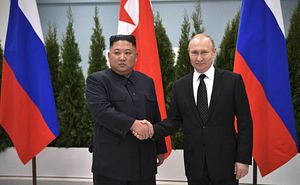Russian President Vladimir Putin said North Korean leader Kim Jong Un confirmed during their first summit Thursday he is willing to give up his nuclear weapons — but only if he gets an ironclad guarantee of security beforehand.
The Russian president stressed that Moscow and Washington both want North Korea to abandon its nuclear weapons. But he said the security guarantees should be underwritten by multiple countries, hinting at an arrangement like the six-nation talks Russia participated in until their collapse in 2009.
Putin added that Kim encouraged him to explain the nuances of Pyongyang’s position to President Donald Trump. He said he’s willing to share details of the summit with the American president.
“I will talk about it tomorrow with the leadership of China,” Putin said before heading to Beijing on a two-day visit after meeting Kim. “And we will just as openly discuss this issue with the U.S. leadership. There are no secrets. Russia’s position always has been transparent. There are no plots of any kind.”
Putin’s remarks after the one-day summit just off the Pacific port city of Vladivostok reflect Kim’s growing frustration with Washington’s efforts to maintain “maximum pressure” until the North commits to denuclearization.
But his characterization of Kim’s comments also suggests there have been no major changes in North Korea’s basic position.
North Korea has all along contended that it needs its nuclear arsenal to defend itself against what it sees as U.S. hostility and wants concrete reassurances of its safety — including the removal of the American nuclear threat as an integral part of the denuclearization of the entire Korean Peninsula.
It wasn’t immediately clear what other agreements the leaders might have struck.
Along with a statement of political support, Kim was believed to be looking for some kind of economic support and possibly even a workaround to sanctions that will force more than 10,000 North Korean laborers in Russia to leave by the end of the year. The laborers are a major source of income for Pyongyang.
On the economic front, both sides share an interest in enhanced cooperation if sanctions are eased.
Russia would like to gain broader access to North Korea’s mineral resources, including rare metals. Pyongyang, for its part, covets Russia’s electricity supplies and investment to modernize its dilapidated Soviet-built industrial plants, railways and other infrastructure.
For Putin, the summit was also seen an opportunity for Russia to emerge as an essential player in the North Korean nuclear standoff.
Moscow has kept a relatively low profile as Kim embarked on what has been an audacious diplomatic journey over the past year.
The Putin summit follows four summits with Chinese President Xi Jinping, three with South Korean President Moon Jae-in, and two with Trump. Despite the current stalemate, Trump has said he would like to meet Kim again. Moon said Thursday he’ll try to hold a fourth summit with Kim and facilitate the resumption of U.S.-North Korea talks.
Since Kim’s latest talks with Trump, in Hanoi, ended without any sign of progress, North Korea has expressed its open anger with what it calls an excessively hardline position by Trump’s top advisers in the deadlocked negotiations.
Last week, Pyongyang demanded U.S. Secretary of State Mike Pompeo be removed from the talks and strongly criticized National Security Adviser John Bolton. There have been reports that Kim has done some internal shaking up as well, possibly firing one of his own main negotiators.
Though Kim appeared confident and respectful as he and Putin met for the first time, he comported himself formally — creating a scene reminiscent of old Soviet-style meetings and a sharp contrast with his more cordial summits with Moon and, at times, even Trump.
“The reason we visited Russia this time is to meet and share opinions with your excellency, President Putin, and also share views on the Korean Peninsula and regional political situation, which has garnered the urgent attention of the world, and also hold deep discussions on strategic ways to pursue stability in the regional political situation and on the matters of jointly managing the situation,” Kim said in a somewhat stilted introduction.
Kim arrived in Vladivostok Wednesday aboard his private train and offered what is possibly his first interview ever with a foreign media outlet.
He told Russian state television that he was hoping his first visit to Russia would be “successful and useful.” He evoked his father’s “great love for Russia” and said that he intends to strengthen ties between the two countries. The late Kim Jong Il made three trips to Russia, the last time in 2011.
Russia, along with both Koreas, China, Japan, and the United States, was part of six-nation talks on the North Korean standoff that fell apart after Pyongyang’s withdrawal in 2009. Putin said he wasn’t sure if the talks could be revived, but he emphasized that international involvement will be needed to discuss guarantees for Pyongyang.
Dmitri Trenin, the director of the Carnegie Moscow Center, said ahead of Thursday’s talks that Putin would try to encourage Kim to continue constructive talks with the United States. But he added that Moscow doubts the North could be persuaded to fully abandon its nuclear weapons, considering that a “mission impossible.”
Kim was expected to return to Pyongyang on Friday.
By Vladimir Isachenkov and Eric Talmadge for The Associated Press. Associated Press writers Hyung-jin Kim and Kim Tong-hyung in Seoul, South Korea, contributed to this report.

































